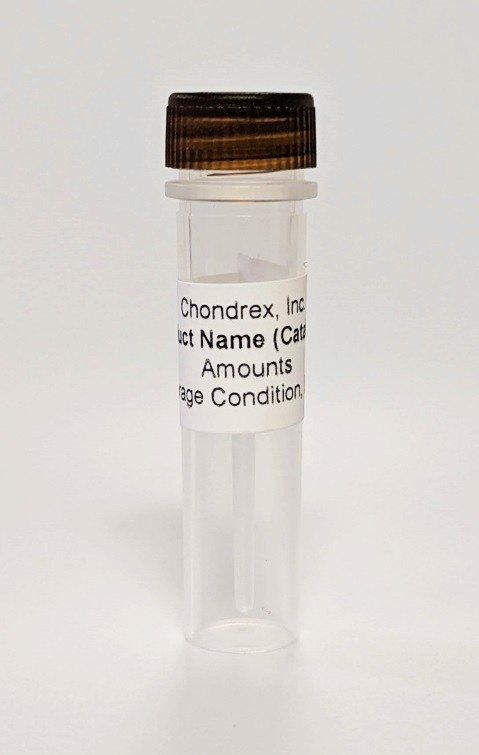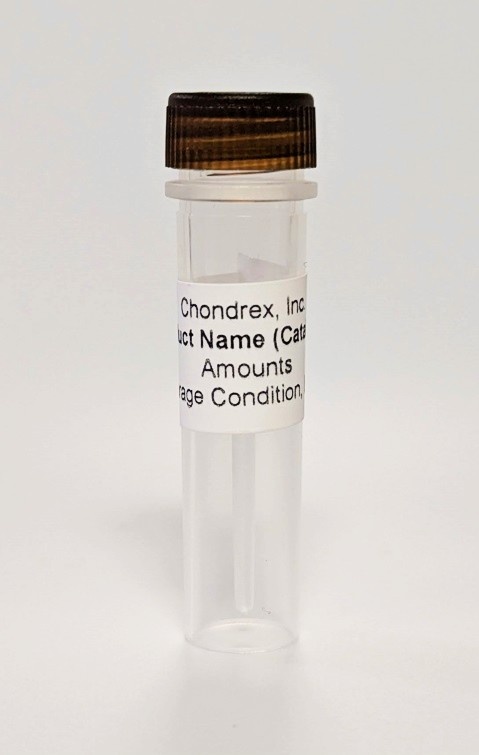Recent studies indicate that environmental factors, especially intestinal microbiota and their toxins, may play pathogenic roles in autoimmune diseases such as rheumatoid arthritis (RA) (1-7), inflammatory bowel diseases (IBDs) (8, 9), systemic lupus erythematosus (SLE) (10), and other chronic disorders (11-13). Moreover, it is considered that increased translocation of bacteria and bacterial toxins due to high mucosal permeability and low immune function may be the primary and common pathogenesis of autoimmune disorders (14). To facilitate research in this field, Chondrex, Inc. offers several mouse anti-bacterial monoclonal antibodies, as well as ELISA kits to detect anti-bacterial antibodies in humans and mice.
Anti-E. coli and LPS Antibodies
| Product | Quantity | Catalog # | Price (USD) | |
|---|---|---|---|---|
 |
Mouse Anti-E. coli and LPS IgG1 Monoclonal Antibody, Clone 1C6 | 1 mg/ml x 0.1 ml | 7098 | 349.00 |
 |
Mouse Anti-E. coli and LPS IgG2a Monoclonal Antibody, Clone 1E1F10 | 1 mg/ml x 0.1 ml | 7099 | 349.00 |
 |
Mouse Anti-E. coli and LPS IgG2b Monoclonal Antibody, Clone 2H10 | 1 mg/ml x 0.1 ml | 7100 | 349.00 |
 |
Mouse Anti-E. coli and LPS IgG3 Monoclonal Antibody, Clone 2A5 | 1 mg/ml x 0.1 ml | 7101 | 349.00 |
 |
Mouse Anti-E. coli IgM Monoclonal Antibody, Clone 3H11 | 1 mg/ml x 0.1 ml | 7102 | 349.00 |
Anti-E. coli and LPS Antibodies
| Product | Quantity | Catalog # | Price (USD) | |
|---|---|---|---|---|
 |
Mouse Anti-E. coli and LPS IgG1 Monoclonal Antibody, Clone 1C6 | 1 mg/ml x 0.1 ml | 7098 | 349.00 |
 |
Mouse Anti-E. coli and LPS IgG2a Monoclonal Antibody, Clone 1E1F10 | 1 mg/ml x 0.1 ml | 7099 | 349.00 |
 |
Mouse Anti-E. coli and LPS IgG2b Monoclonal Antibody, Clone 2H10 | 1 mg/ml x 0.1 ml | 7100 | 349.00 |
 |
Mouse Anti-E. coli and LPS IgG3 Monoclonal Antibody, Clone 2A5 | 1 mg/ml x 0.1 ml | 7101 | 349.00 |
 |
Mouse Anti-E. coli IgM Monoclonal Antibody, Clone 3H11 | 1 mg/ml x 0.1 ml | 7102 | 349.00 |
Anti-P. gingivalis and LPS Antibodies (New!)
| Product | Quantity | Catalog # | Price (USD) | |
|---|---|---|---|---|
 |
Mouse Anti-P. gingivalis and LPS IgG3 Monoclonal Antibody, Clone 2-3A11 | 1 mg/ml x 0.1 ml | 7140 | 260.00 |
 |
Mouse Anti-P. Gingivalis and LPS IgM Monoclonal Antibody, Clone 2-3G1 | 1 mg/ml x 0.1 ml | 7139 | 260.00 |
Anti-Staphylococcal Enterotoxin A Antibodies
| Product | Quantity | Catalog # | Price (USD) | |
|---|---|---|---|---|
 |
Mouse Anti-Staphylococcal Enterotoxin A (SEA) IgG1 Monoclonal Antibody, Clone 6B5F2 | 1 mg/ml x 0.1 ml | 7106 | 349.00 |
 |
Mouse Anti-Staphylococcal Enterotoxin A (SEA) IgG2a Monoclonal Antibody, Clone 2E11F7 | 1 mg/ml x 0.1 ml | 7107 | 349.00 |
 |
Mouse Anti-Staphylococcal Enterotoxin A (SEA) IgG2b Monoclonal Antibody, Clone 1E10G12 | 1 mg/ml x 0.1 ml | 7108 | 349.00 |
Anti-Staphylococcal Enterotoxin B Antibodies
| Product | Quantity | Catalog # | Price (USD) | |
|---|---|---|---|---|
 |
Mouse Anti-Staphylococcal Enterotoxin B (SEB) IgG1 Monoclonal Antibody, Clone 2D1G10 | 1 mg/ml x 0.1 ml | 7103 | 349.00 |
 |
Mouse Anti-Staphylococcal Enterotoxin B (SEB) IgG2a Monoclonal Antibody, Clone 1B10A6 | 1 mg/ml x 0.1 ml | 7104 | 349.00 |
 |
Mouse Anti-Staphylococcal Enterotoxin B (SEB) IgG2b Monoclonal Antibody, Clone 5D12C9 | 1 mg/ml x 0.1 ml | 7105 | 349.00 |
Monoclonal Antibody Cross-reactivity

*Indicates reactivity with whole bacteria and LPS.
#Indicates reactivity with only whole bacteria.
Usage Tips:
Chondrex, Inc. strongly recommends using ChonBlock buffer to minimize non-specific false-positive and false-negative reactions, especially when working with antibodies against environmental factors. To learn more about ChonBlock and how it can improve your assay results, see our blog posts here.
References
1. Aoki S. et al. Role of enteric bacteria in the pathogenesis of rheumatoid arthritis: evidence for antibodies to enterobacterial common antigens in rheumatoid sera and synovial fluids. Ann Rheum Dis 55:363-9 (1996).
2. Van der Heijden IM. et al. Presence of bacterial DNA and bacterial peptidoglycans in joints of patients with rheumatoid arthritis and other arthritides. Arthritis Rheum 43:593-8 (2000).
3. Terato K. et al. Induction of chronic autoimmune arthritis in DBA/1 mice by oral administration of type II collagen and E.coli LPS. Br J Rheum 35:828-838 (1996).
4. Peltonen R. et al. Faecal microbial flora and disease activity in rheumatoid arthritis during a vegan diet. Br J Rheumatol 36:64-8 (1997).
5. Toivanen P. Normal intestinal microbiota in the aetiopathogenesis of rheumatoid arthritis. Ann Rheum Dis 62:807-11 (2003).
6. Vaahtovuo J. et al. Fecal microbiota in early rheumatoid arthritis. J Rheumatol 35:1500-5 (2008).
7. Edwards C. Commensal Gut Bacteria and the Etiopathogenesis of Rheumatoid Arthritis. J Rheum 35 :1477-78 (2008).
8. Dayna Shi J. Inflammatory bowel disease requires the interplay between innate and adaptive immune signals. Cell Research 16:70-74 (2006).
9. Nell S. et al. The impact of the microbiota on the pathogenesis of IBD: lessons from mouse infection models. Nat Rev Microbiol 8:564-77 (2010).
10. Cavallo T. Bacterial lipopolysaccharide induces long-lasting IgA deficiency concurrently with features of polyclonal B cell activation in normal and in lupus-prone mice. Clin Exp Immunol 84:134-138 (1991).
11. Penhale WJ. The influence of the normal microbial flora on the susceptibility of rats to experimental autoimmune thyroiditis. Clin Exp Immunol 72:288-92 (1998).
12. Murakami M. et al. Oral administration of lipopolysaccharides activates B-1 cells in the peritoneal cavity and lamina propria of the gut and induces autoimmune symptoms in an autoantibody transgenic mouse. J Exp Med 180:111-21 (1994).
13. Nymark M. et al. Serum lipopolysaccharide activity is associated with the progression of kidney disease in finnish patients with type 1 diabetes. Diabetes Care 32:1689-93 (2009).
14. Terato K. et al. Preventing intense false positive and negative reactions attributed to the principle of ELISA to re-investigate antibody studies in autoimmune diseases. J Immunol Methods 407:15-25 (2014).